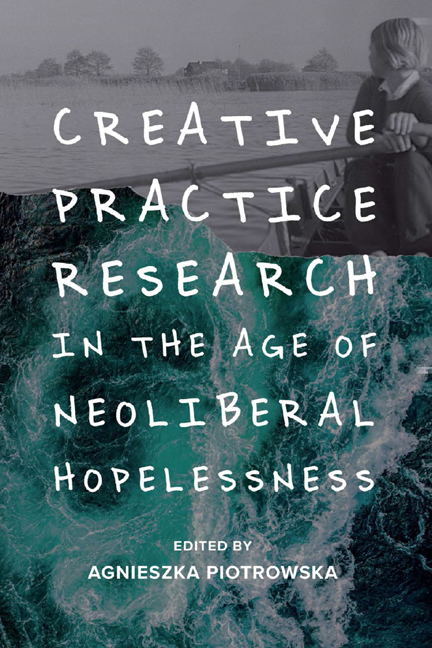Book contents
- Frontmatter
- Contents
- List of Figures
- Notes on Contributors
- Acknowledgements
- Preface: Life in the Post Pandemic Age
- Dedication
- 1 Introduction: Complexities, Compromises and Complicities
- 2 Against the Grain: Women Film Practitioners and Theorists Talk Creative Practice and Theory
- 3 Married to the Eiffel Tower: Notes on Love, Loss and Knowledge
- 4 Creativity and Neoliberalism: Between Autonomy, Resistance and Tactical Compliance
- 5 Tactical Compliance and the Persistence of Elsaesser
- 6 Storytelling and Game Playing
- 7 Autonomy and the Other Woman: Queer Active Agency and Postcolonial Expectations
- 8 From Neolithic to Neoliberal
- 9 First-person Expression on ‘Non-Western’ Screens: China as a Case Study
- 10 Scholarly Exploration of the Creative Process: Integrating Film Theory and Practice
- 11 Teaching Practice as Theory: Guerrilla Filmmaking
- 12 Baits of Falsehood: The Role of Fiction in Documentary or From Untheorised Practice to Unpractised Theory
- 13 Repented: A Creative Intersemiotic Translation
- Notes on Repented
- 14 How do you see me? The Camera as Transitional Object in Diasporic, Domestic Ethnography
- 15 ‘Shut Your Hole, Girlie. Mine's Making Money, Doll’: Creative Practice-Research and the Problem of Professionalism
- 16 Feminist ‘Pensive-creative Praxis’ and Irigaray: A Porous, Dialogical Encounter
- 17 The Paths of Creation, or How Can I Help my Dybbouk to Get Out of Me?
- 18 ‘We Want to Kill Boko Haram’: Reflections on the Photographic Representation of Children in a Displacement Camp
- 19 Between ‘Counter-movement’ (Ingold) and ‘Living with Ghosts’ (Demos)
- 20 Screen Memories: A Video Essay on Smultronstället/Wild Strawberries
- Index
2 - Against the Grain: Women Film Practitioners and Theorists Talk Creative Practice and Theory
Published online by Cambridge University Press: 17 October 2020
- Frontmatter
- Contents
- List of Figures
- Notes on Contributors
- Acknowledgements
- Preface: Life in the Post Pandemic Age
- Dedication
- 1 Introduction: Complexities, Compromises and Complicities
- 2 Against the Grain: Women Film Practitioners and Theorists Talk Creative Practice and Theory
- 3 Married to the Eiffel Tower: Notes on Love, Loss and Knowledge
- 4 Creativity and Neoliberalism: Between Autonomy, Resistance and Tactical Compliance
- 5 Tactical Compliance and the Persistence of Elsaesser
- 6 Storytelling and Game Playing
- 7 Autonomy and the Other Woman: Queer Active Agency and Postcolonial Expectations
- 8 From Neolithic to Neoliberal
- 9 First-person Expression on ‘Non-Western’ Screens: China as a Case Study
- 10 Scholarly Exploration of the Creative Process: Integrating Film Theory and Practice
- 11 Teaching Practice as Theory: Guerrilla Filmmaking
- 12 Baits of Falsehood: The Role of Fiction in Documentary or From Untheorised Practice to Unpractised Theory
- 13 Repented: A Creative Intersemiotic Translation
- Notes on Repented
- 14 How do you see me? The Camera as Transitional Object in Diasporic, Domestic Ethnography
- 15 ‘Shut Your Hole, Girlie. Mine's Making Money, Doll’: Creative Practice-Research and the Problem of Professionalism
- 16 Feminist ‘Pensive-creative Praxis’ and Irigaray: A Porous, Dialogical Encounter
- 17 The Paths of Creation, or How Can I Help my Dybbouk to Get Out of Me?
- 18 ‘We Want to Kill Boko Haram’: Reflections on the Photographic Representation of Children in a Displacement Camp
- 19 Between ‘Counter-movement’ (Ingold) and ‘Living with Ghosts’ (Demos)
- 20 Screen Memories: A Video Essay on Smultronstället/Wild Strawberries
- Index
Summary
INTRODUCTION
Three noted independent women film practitioners and theorists working in Britain debate the contrast and overlap in their approaches, all produced from within the academy. Eylem Atakav, a theorist, turned to practice for her film on child brides, Growing Up Married (2016); Jill Daniels takes a first-person approach in the production of essay films in order to comment on the social world; Rachel Velody produces ‘theory-as practice’. The debate focuses on how the context of transnational moving-image production and distribution industries, areas that are seemingly tainted with neoliberal address, restrictive diversity and isolationist discourse may be challenged. We ask whether our own disparate creative practice and theory produced from within the academy enables us to challenge these dominant forms of film address and whether, and in what ways, these may effect change. We do not aim for a singular binary resolution but to explore our practice as exemplars of responses to issues that are facing us both inside and outside the academy and to outline the possibilities of a response through our future practice and dialogue with other creative practitioners and theorists.
ARRIVAL
Jill: On leaving film school in the late 1970s I had no connection to academia. I operated as an independent filmmaker. The starting point for my practice was experimental fiction. I made my first fiction film, I’m In Heaven (1989) about a Jewish woman estranged from her family living in a tower block. It was produced through a form of crowd funding and a small funding grant from South East Arts. The film went to film festivals and won an award. I thought that was the start of my filmmaking career. But it was the end of my fiction filmmaking career. I turned to documentary because funding was easier. My interest was in mediating contested identities, taking my secular Jewish identity as a starting point. I was politically engaged in the socialist women's movement. But I had a fine art background and I felt that conventional documentary filmmaking was very restrictive, and I couldn't see a way to bring together my political activity, my interest in the representation of human subjects and my interest in film language. I came into academia in 2003 to teach film and saw the idea of practice as research. That was how I evolved.
- Type
- Chapter
- Information
- Publisher: Edinburgh University PressPrint publication year: 2020



